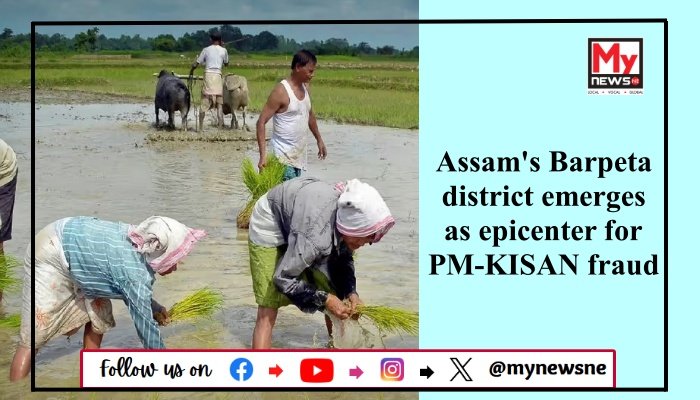Massive Fraud Exposed in Assam’s PM-KISAN Scheme, Barpeta District at the Centre of Irregularities
Guwahati: Barpeta district in Assam has emerged as the epicenter of widespread fraud in the PM-KISAN scheme, with the highest number of ineligible beneficiaries identified across the state.
A recent audit by the Comptroller and Auditor General (CAG) revealed that a staggering Rs 567 crore was disbursed to ineligible recipients in Assam, with Barpeta accounting for a substantial portion of the misappropriated funds.
Alarmingly, recovery efforts have been dismal, with only 0.24% of the funds reclaimed, highlighting severe lapses in monitoring and data management.
The PM-KISAN scheme, launched by the Central Government to provide financial assistance to small and marginal farmers, faced serious implementation challenges in Assam. The CAG’s audit found that, of the 41,87,023 total applications received in the state between December 2018 and March 2021, 10,66,593 (25%) were flagged as ineligible by the PM-KISAN portal and the Public Financial Management System (PFMS).
Later investigations identified an additional 15,59,286 ineligible applicants, bringing the total number of fraudulent entries to over 15.5 lakh.
Barpeta district stood out in the audit due to its alarmingly high number of ineligible beneficiaries. A verification exercise conducted between May and July 2020, prompted by complaints from the public, revealed that 11,72,685 beneficiaries in Barpeta—nearly 37% of the district’s total registrants—were ineligible. Furthermore, 72.54% of the ineligible beneficiaries statewide, or 11,31,152 individuals, could not be traced, pointing to large-scale fake entries in Barpeta and other districts.
The audit also uncovered multiple instances of fraudulent activities, including the creation of fake accounts using modified bank account numbers. In some cases, zeros were added to account numbers, enabling duplicate benefits to be credited to the same account. Across 16 districts, 3,577 such fake registrations were discovered, resulting in Rs 3.01 crore being misappropriated. Additionally, over 3,000 instances of multiple registrations under the same bank account were flagged across 10 districts, although no benefits had been released to these accounts.
Financial mismanagement was also a major concern. While Rs 567 crore was disbursed across Assam, only Rs 1.36 crore—less than 0.24%—had been recovered by October 2021. In Barpeta, out of Rs 2.18 crore allocated for administrative expenses, only Rs 77 lakh was substantiated by utilization certificates, leaving Rs 1.41 crore unaccounted for. These discrepancies suggest a lack of accountability and oversight in the district’s implementation of the scheme.
The audit further revealed that physical verification of beneficiaries, a key requirement under PM-KISAN’s guidelines, was not adequately carried out in Barpeta. This failure to verify recipients on the ground allowed fake entries and ineligible beneficiaries to remain in the system unchecked, contributing to the misuse of funds.
In response to these findings, the Assam government launched a re-verification drive in June 2021, led by district revenue officials under the supervision of the Deputy Commissioner. This initiative aims to review the eligibility of all beneficiaries in Barpeta and other districts, ensuring that only genuine farmers benefit from the scheme. By February 2022, the state government assured that corrective measures were underway to address the issues highlighted in the CAG report.
The fraud uncovered in Barpeta underscores the urgent need for stronger verification protocols, better data management, and more stringent monitoring of welfare schemes. The CAG’s findings have not only raised questions about the administrative practices in Barpeta but have also called attention to broader concerns about the implementation of PM-KISAN across Assam and the monitoring mechanisms in place to prevent fraud.
Moving forward, the Assam government plans to implement stricter eligibility checks and guidelines to ensure that the PM-KISAN scheme reaches only those who truly need it—small and marginal farmers. For Barpeta, the audit’s revelations offer an opportunity to overhaul its approach to implementing welfare programs. By focusing on improved data management, effective use of allocated funds, and regular physical verification, the district authorities can restore the integrity of the scheme and ensure that it truly supports those who depend on it for their livelihoods.

